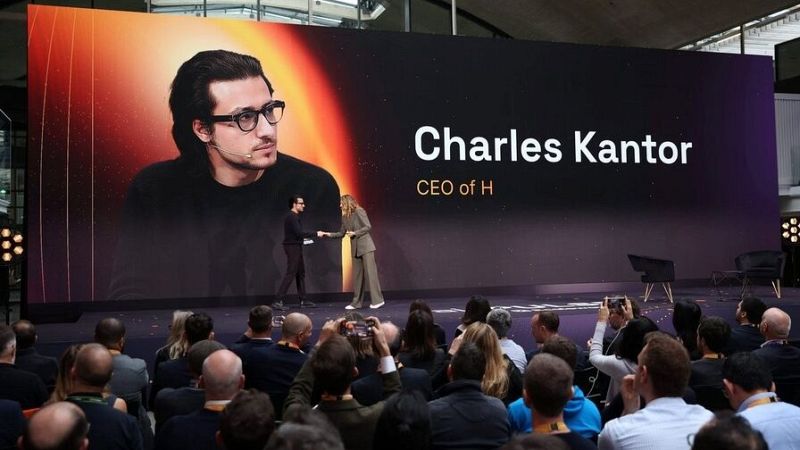
French artificial intelligence (AI) start-up H Company, which launched last year and raised hundreds of millions of euros in investment before it had even released its first product, brought out three new AI agents on Tuesday.
"We are all in on the agentic race, that's our path. We are even potentially ahead with really good results in computer use technologies," Charles Kantor, the company’s CEO and co-founder, told Euronews Next.
Agentic AI models, or AI agents, do not just process information but also try to plan and complete tasks and solve problems.
However, Kantor said that humans would “always be at the centre” of their AI models, so that if the agent wrote an email, it would just be a draft and only the human would be able to send the message.
The three models that H has released are called Runner H, Tester H, and Surfer H.
H said that the three products reflect the company’s vision for a "trusted, action-oriented AI that delivers task execution beyond traditional chatbots".
It claims that it achieves a 92.2 per cent success rate while reducing costs by up to 5.5 times against competitors such as OpenAI, Anthropic, and Google.
What are the three models?
Runner H allows users to automate workflows and streamline tasks. Kantor said it was "a more advanced version of Manus," he said, referring to the Chinese AI agent. It is aimed at consumer use.
Surfer H allows you to surf the web and navigate browser environments, and the company claims the model achieved a 92.2 per cent task completion accuracy on the WebVoyager benchmark at $0.13 (€0.11) per task.
This is much cheaper than competitors, such as OpenAI’s Operator agent, which costs $200 (€175) per month for its Pro subscription plan.
"It's really like almost an agent acting on your behalf, using planning to visual capabilities to recognise interfaces, clicking, scrolling, acting, fetching information, and so on," Kantor said.
Tester H is the final new model, which is built more for enterprise use with one of the big things it can do being software testing.
But it can also do things such as smart email replies. You can ask the agent to read your recent emails, and it can draft template answers. But the agent will not hit send; only the human can do this.
H said that the three products reflect the company’s vision for a “trusted, action-oriented AI that delivers task execution beyond traditional chatbots”.
All the models are trained on synthetic data, which means it uses artificially generated data designed to mimic real-world data, allowing the company to meet Europe’s GDPR rules on data protection.
According to Kantor, he personally uses H’s AI models for the interconnection between tools such as emails and documents to prepare information, such as for billing or drafting emails.
But he also uses it for preparing company content that is then reviewed, such as for ads and markets.
“When you start to review the work of an agent, you start to feel the productivity,” he said.
The ‘clear’ agentic vision
H Company created a buzz when it launched last year. Kantor was a university professor at Stanford while the start-up’s other co-founders came from DeepMind.
Meanwhile, investment came from LVMH’s CEO Bernard Arnault, Iliad founder Xavier Niel, Amazon, Samsung, and former Google CEO Eric Schmidt, among others.
But just several months after launch, three of the co-founders - Daan Wierstra, Karl Tuyls, and Julien Perolat - quit due to “operational differences,” the company said in a LinkedIn post.
For Kantor, the situation surrounding their departure is "in the past".
"We had this kind of strategic disalignment, but now they are ambassadors of the company, and H’s vision is really clear," he said.
"We want to be at the state of the art in terms of action models and the agentic space, and we want this technology to benefit humanity".
The company now has around 70 employees in Paris and the United Kingdom and has a big research and engineering department.
"It's kind of the concerto of age. You need to be able to really orchestrate in the right manner: Product, research, and engineering synergies to build category-defining AI," he said.
For Kantor, agentic AI is the next phase of AI, which will be vital to physical AI, which NVIDIA spoke of at length two weeks ago.
"We're gonna see a lot of companies thriving worldwide, but also in France, in robotics. I think Agent AI is gonna be the heart, the gist, I may say, of many fields," Kantor said, referring to computer games, simulated worlds, and robotics.
"The software part of robotics is gonna be based on agentics, superintelligence. The opportunities are numerous".







